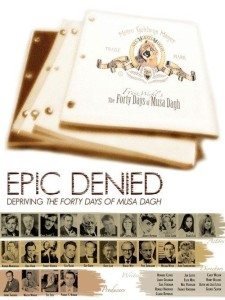Franz Werfel’s 1933 novel, The Forty Days of Musa Dagh, portrayed one small Armenian community’s efforts to resist deportation and massacre during the genocide. The novel was highly controversial—having been banned by Nazi Germany and Turkey—and several attempts to produce a Hollywood film were blocked. The documentary Epic Denied: Depriving ‘The Forty Days of Musa Dagh’depicts the trials and tribulations of Hollywood’s multiple attempts to produce a film based on Werfel’s bestseller, which, according to Variety magazine, has become “the most on-again and off-again motion picture production in Hollywood history.”

The documentary, however, has yet to be completed. In order to finance the project, the producers have launched an online fundraising campaign. One of the producers/filmmakers, Edwin Avaness, spoke with the Weekly about the importance of this feature-length documentary making its way to the public.
The objective
“Our goal is to give audiences a unique look at the controversy surrounding the novel, and the unprecedented political maneuverings by foreign forces to halt the production of the motion picture,” explained Avaness. He also noted the key themes that will be explored, including conspiracy, complicity, collusion, and blatant censorship in the context of Hollywood’s history, and infringement of the First Amendment by a foreign power.
“After reading the book, we saw the importance of the content and decided to option the rights and make a documentary,” he said. The project is thoroughly documented based on research in the MGM archives, the U.S. State Department, the Franz Werfel Papers at the UCLA Special Collections Library, the American Film Institute, and interviews of personalities involved in the film project. The “basic components of historical research are covered in a manner that finally unveils the truth of a film denied,” Avaness said.
“Organizers and activists know the power of the media and how a good documentary motivates audiences into action. That is why we also plan to invite civil liberties organizations to use [our documentary] as a tool of engagement, and to promote the importance of free expression in media,” Avaness told the Weekly.
Future Hollywood production?
Prominent directors and actors such as Elia Kazan, Rouben Mamoulian, and Sylvester Stallone throughout the decades have attempted to produce the film based on Werfel’s novel. Avaness describes how Dore Schary, the successor to MGM Studio boss Louis B. Mayer, believed that The Forty Days of Musa Dagh was one of the few great books written since War and Peace by Leo Tolstoy, and dreamed of making the movie.
In 1934, MGM purchased the rights to make the novel into a motion picture. “Undertaken by veteran producer Irving Thalberg in the 1930’s to unknown millionaire John Kurkjian in the 1980’s, the project faced enormous foreign intervention and blackmail, preventing it from reaching the silver screen,” he explained.
Avaness noted that today’s Hollywood is not the same as it was in the 1930’s. “Therefore, the question becomes how profitable an epic film based on Franz Werfel’s novel will be?”
Next step
Research and development of the documentary have already been completed. “Our next phase is interviewing individuals in the entertainment industry who were involved in various capacities through the many incarnations of the project, as well as scholars who have the expertise to shed light on this untold story,” Avaness detailed.
He stressed that The Forty Days of Musa Dagh is “an important part of the Motion Picture history. We need everyone’s help to document it.”
To make a tax-deductible donation to “Epic Denied: ‘The Forty Days of Musa Dagh,’” visit www.indiegogo.com/EpicDenied.
For more information about the project, visit www.epicdenied.com.


The truth/justice shall prevail. All those who have suffered through a genocide need to UNITE , so history doesn’t repeat itself .
The biography of Franz Werfel by Peter Stephan Jungk is now available as an eBook Franz Werfel: A Life in Prague, Vienna, and Hollywood
Great job Lilly. Keep up the good work.
This is an important story. Not only the history of Musa Dagh but the story of simply telling the history is important.
Reminds me of America America made in 1966. The main charactor being changed to Greek because of objections.
John,
I believe you are mistaken. America, America was the story of Elia Kazan’s uncle, who emigrated from Anatolia to America.The story begins with Vartan, an enterprising villager bringing ice to town to sell, only to see Turks burning Armenians alive in the village Church. This and other events cause the protagonist Uncle to realize his gigantic ambition to reach America, where he kisses the ground on disembarkation. He takes the name of a shipmate, Ohaness, which the Ellis Island authorities turn into Van Ness.
However, he was and had to be Greek.
I didn’t know about this film “America, America”
http://www.youtube.com/watch?v=3hnI-nKoJug&feature=related
Bu insanlık trajedisinde bende anne tarafından ninemi ve dedemi
kaybettim.iki senedir bu trajediyle yaşıyorum gece gündüz
imgelemimde.
bu trajedinin günahkarları dün ve bugün ayni,sadece maskeleri
değişmiş,yüzlerinde.